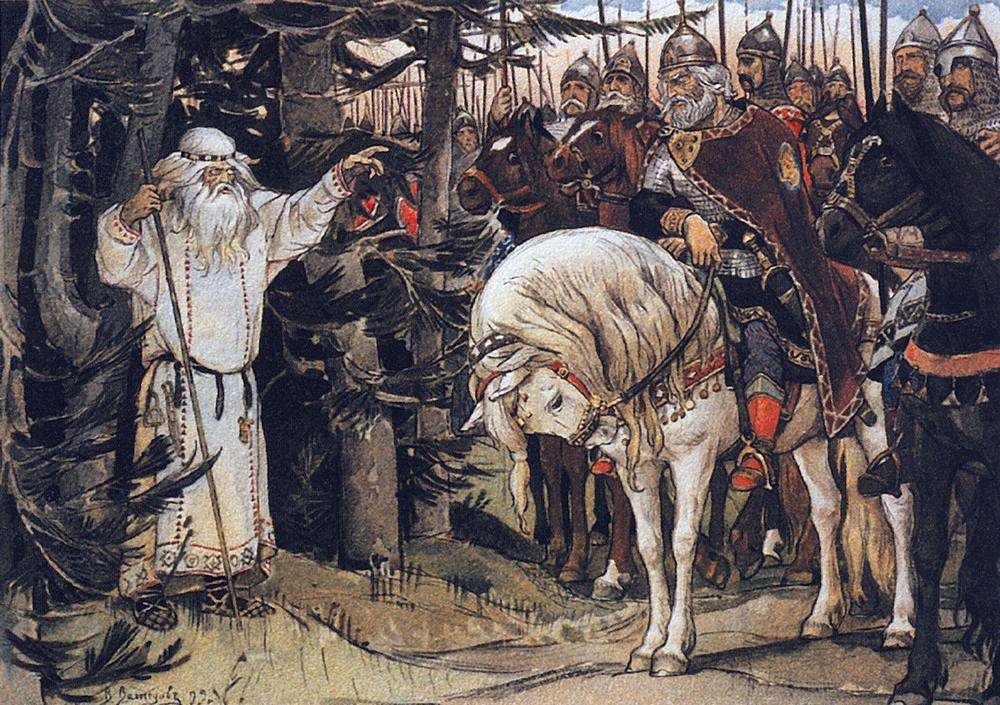Volkhv on:
[Wikipedia]
[Google]
[Amazon]
 A volkhv or volhv ( Cyrillic: Волхв; Polish: Wołchw, translatable as wiseman, wizard, sorcerer, magus, i.e.
A volkhv or volhv ( Cyrillic: Волхв; Polish: Wołchw, translatable as wiseman, wizard, sorcerer, magus, i.e.
 In contemporary Slavic Native Faith, the volkhvs are those responsible for holding rites for worshipping the gods and leading communities and religious festivals. Volkhvs are the higher rank of the sacerdotal hierarchy, the lesser order being that of the '' zhrets''. The latter are not necessarily shamans, and their function is merely to hold sacrifices (the word ''zhrets'' literally means "sacrificer", from Proto-Slavic *''žьrti'', and is cognate of Slavic words for "offering"). Though the majority of priests are males, most groups do not exclude women from the priesthood, so that a parallel female priesthood is constituted by the two ranks of ''zhritsa'' and ''vedunya'' ("seeresses"). Prestige is not limited to male priests; a priestess,
In contemporary Slavic Native Faith, the volkhvs are those responsible for holding rites for worshipping the gods and leading communities and religious festivals. Volkhvs are the higher rank of the sacerdotal hierarchy, the lesser order being that of the '' zhrets''. The latter are not necessarily shamans, and their function is merely to hold sacrifices (the word ''zhrets'' literally means "sacrificer", from Proto-Slavic *''žьrti'', and is cognate of Slavic words for "offering"). Though the majority of priests are males, most groups do not exclude women from the priesthood, so that a parallel female priesthood is constituted by the two ranks of ''zhritsa'' and ''vedunya'' ("seeresses"). Prestige is not limited to male priests; a priestess,
File:Приход Глеба Святославича Новгородского к волхву.jpg, Gleb Svyatoslavich kills the volkhv. Novgorod, 1071. '' Radziwiłł Chronicle''.
File:Vedun by Dušan Božić.jpg, Modern artistic vision of volkhv by Serbian artist Dušan Božić.
File:Wołchw by Aleksander Karcz.jpg, Modern artistic vision of volkhv by Polish artist Aleksander Karcz.
File:Volkhv by Andrey Shishkin.jpg, Modern artistic vision of volkhv by Russian artist
 A volkhv or volhv ( Cyrillic: Волхв; Polish: Wołchw, translatable as wiseman, wizard, sorcerer, magus, i.e.
A volkhv or volhv ( Cyrillic: Волхв; Polish: Wołchw, translatable as wiseman, wizard, sorcerer, magus, i.e. shaman
Shamanism is a religious practice that involves a practitioner (shaman) interacting with what they believe to be a spirit world through altered states of consciousness, such as trance. The goal of this is usually to direct spirits or spir ...
, gothi or mage
Mage most commonly refers to:
* Mage (paranormal) or magician, a practitioner of magic derived from supernatural or occult sources
* Mage (fantasy) or magician, a type of character in mythology, folklore, and fiction
*Mage, a character class in so ...
) is a priest in ancient Slavic religions and contemporary Slavic Native Faith (Rodnovery).
In modern Slavic priesthood
 In contemporary Slavic Native Faith, the volkhvs are those responsible for holding rites for worshipping the gods and leading communities and religious festivals. Volkhvs are the higher rank of the sacerdotal hierarchy, the lesser order being that of the '' zhrets''. The latter are not necessarily shamans, and their function is merely to hold sacrifices (the word ''zhrets'' literally means "sacrificer", from Proto-Slavic *''žьrti'', and is cognate of Slavic words for "offering"). Though the majority of priests are males, most groups do not exclude women from the priesthood, so that a parallel female priesthood is constituted by the two ranks of ''zhritsa'' and ''vedunya'' ("seeresses"). Prestige is not limited to male priests; a priestess,
In contemporary Slavic Native Faith, the volkhvs are those responsible for holding rites for worshipping the gods and leading communities and religious festivals. Volkhvs are the higher rank of the sacerdotal hierarchy, the lesser order being that of the '' zhrets''. The latter are not necessarily shamans, and their function is merely to hold sacrifices (the word ''zhrets'' literally means "sacrificer", from Proto-Slavic *''žьrti'', and is cognate of Slavic words for "offering"). Though the majority of priests are males, most groups do not exclude women from the priesthood, so that a parallel female priesthood is constituted by the two ranks of ''zhritsa'' and ''vedunya'' ("seeresses"). Prestige is not limited to male priests; a priestess, Halyna Lozko
Halyna Lozko ( uk, Галина Сергіївна Лозко) (Yelanets ( uk, Єланець); 3 February 1952 in Mykolaiv Oblast) is Ukrainian ethnologist, theologian and neopagan leader. In 1993 she founded the group Pravoslavia in Kyiv, whi ...
from Ukraine, is an acknowledged authority within the religious movement.
In 2012, three Russian Rodnover organisations, the Union of Slavic Rodnover Communities, the Circle of the Pagan Tradition and the Circle of Veles, signed an "Agreement on Mutual Recognition of Priests", instituting a common priesthood and the criteria for the ordination of those wishing to become Slavic priests.
Among the olden Rus'
Volkhvs are attested among the early Rus' people. Volkhvs were believed to possess mystical powers, particularly the ability to predict the future. The first literary reference to a volkhv occurs in the Primary Chronicle under the year 912; there, the priest-soothsayer predicts Prince Oleg's death. With the adoption of Christianity, the pagan priests came under persecution and sometimes tried to channel social discontent against the Christian church. The name of the divination book "Volkhovnik
''Volkhovnik'' (from orv, волхвъ, 'sorcerer, shaman, magus') was an Old Russian book of divinatory nature which included collections of signs and their interpretations.
Structure
Modern researchers characterize ''Volkhovnik'' as a colle ...
" comes from the term "''volkhv''".
Artwork
Andrey Shishkin
Andrey Alekseyevich Shishkin (russian: Андрей Алексеевич Шишкин; born 1960) is a Russian painter. His works are one of the most prominent examples of the modern Russian "pagan art" scene related to Slavic Native Faith in Russ ...
.
See also
* Gothi, the Germanic priests * Slavic Native Faith *Volkhovnik
''Volkhovnik'' (from orv, волхвъ, 'sorcerer, shaman, magus') was an Old Russian book of divinatory nature which included collections of signs and their interpretations.
Structure
Modern researchers characterize ''Volkhovnik'' as a colle ...
References
Citations
Sources
* * * {{Slavic mythology Priests Religious occupations Russian folklore Slavic titles Slavic paganism Eurasian shamanism